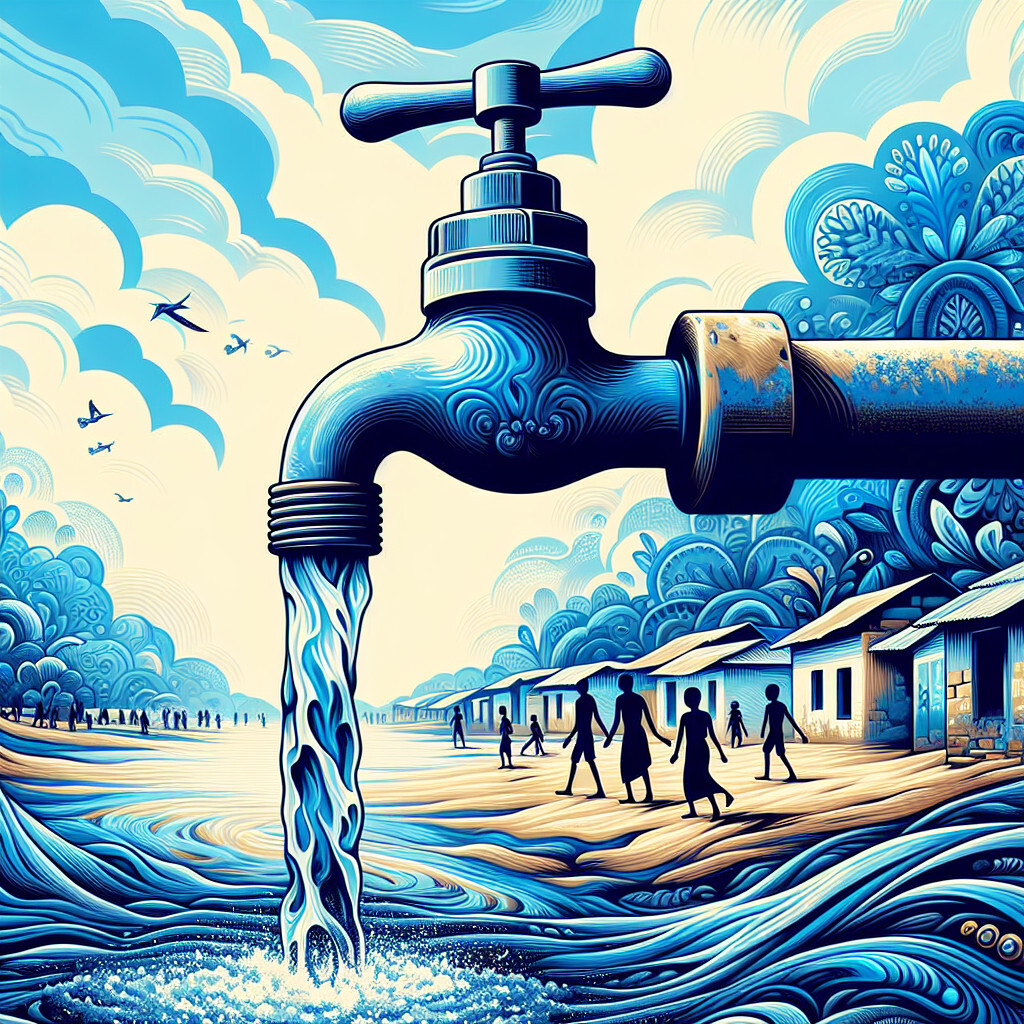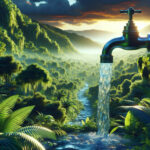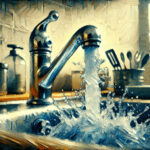-
Table of Contents
“Liberia’s Tap Water: A Challenge of Quality and Accessibility.”
Introduction

The tap water in Liberia is generally not safe for consumption without treatment. The country has long struggled with providing clean and safe drinking water for its population due to inadequate infrastructure, poor sanitation, and the aftermath of a 14-year civil war that severely damaged the water system. As a result, many Liberians rely on untreated sources like wells, rivers, and hand pumps, which can carry waterborne diseases. Efforts are being made to improve the situation, but access to clean tap water remains a significant issue in Liberia.
Understanding the Quality of Tap Water in Liberia
Liberia, a West African nation, is known for its rich history, vibrant culture, and diverse population. However, one aspect that often goes unnoticed is the quality of its tap water. The state of tap water in Liberia is a critical issue that has significant implications for public health, economic development, and social equity. This article aims to provide an in-depth understanding of the quality of tap water in Liberia.
Liberia’s water infrastructure has been severely affected by years of civil war and economic instability. The country’s water supply system is characterized by a lack of access to clean and safe drinking water, particularly in rural areas and impoverished urban communities. According to the World Health Organization, only 25% of the Liberian population has access to clean drinking water, and even less have access to improved sanitation facilities.
The quality of tap water in Liberia is generally poor. The water is often contaminated with harmful bacteria, viruses, and parasites, which can cause a range of health problems, including diarrhea, cholera, and typhoid fever. Additionally, the water often contains high levels of iron and other minerals, which can give it a distinct taste and color. This is due to the country’s rich mineral deposits and the lack of adequate water treatment facilities.
The Liberian government, in collaboration with international organizations, has made efforts to improve the quality of tap water. These efforts include the construction of new water treatment plants, the rehabilitation of existing facilities, and the implementation of community-based water management programs. However, these initiatives have been hampered by a lack of funding, technical expertise, and institutional capacity.
Furthermore, the issue of water quality in Liberia is closely linked to the broader challenges of poverty, inequality, and underdevelopment. Many Liberians cannot afford to buy bottled water or install home water treatment systems. As a result, they are forced to rely on unsafe sources of water, such as rivers, wells, and rainwater. This situation is particularly acute in rural areas, where access to clean water is often a luxury rather than a basic right.
In conclusion, the quality of tap water in Liberia is a pressing issue that requires urgent attention. While the government and its partners have made some progress in improving the water supply system, much more needs to be done. Addressing the water crisis in Liberia will require a comprehensive approach that includes not only technical solutions but also efforts to tackle the underlying social and economic issues. It is a task that demands the collective efforts of the government, civil society, and the international community.
In the meantime, it is advisable for those living in or visiting Liberia to take precautions when it comes to tap water. Boiling water before use or using water purification tablets can help to reduce the risk of waterborne diseases. Additionally, bottled water is widely available in urban areas, although it may be more difficult to find in rural areas. By understanding the challenges and taking appropriate measures, we can all contribute to ensuring that everyone in Liberia has access to clean and safe drinking water.
The Current State of Liberia’s Tap Water System
Liberia, a West African nation, has been grappling with the challenge of providing clean, safe, and accessible tap water to its citizens for many years. The country’s tap water system is currently in a state that leaves much to be desired, with a significant portion of the population lacking access to this basic necessity. This article aims to shed light on the current state of Liberia’s tap water system.
The aftermath of a 14-year civil war, which ended in 2003, left Liberia’s infrastructure, including its water system, in ruins. The war not only destroyed the physical infrastructure but also led to the loss of skilled labor needed to rebuild and maintain the system. Consequently, the country has been struggling to provide its citizens with reliable access to clean tap water.
According to the World Health Organization, only 25% of Liberia’s population has access to clean drinking water. This means that a staggering 75% of the population relies on unimproved water sources such as rivers, wells, and rainwater. The situation is even more dire in rural areas where access to clean tap water is virtually non-existent.
The quality of the tap water that is available is also a cause for concern. Liberia’s water supply is often contaminated with harmful bacteria and parasites due to inadequate sanitation and waste management systems. This poses a significant health risk to the population, leading to waterborne diseases such as cholera, typhoid, and diarrhea, which are among the leading causes of death in the country.
Efforts have been made to improve the situation. The Liberian government, in collaboration with international organizations such as UNICEF and the World Bank, has initiated several projects aimed at improving the country’s water infrastructure. These initiatives include the construction of new water treatment plants, the rehabilitation of existing ones, and the drilling of boreholes in rural areas.
However, these efforts have been hampered by numerous challenges. Corruption, lack of funding, and inadequate maintenance of the existing infrastructure are among the major obstacles. Additionally, the country’s difficult terrain and the high cost of transporting materials make it challenging to extend the water network to remote areas.
Despite these challenges, there have been some notable improvements. The capital city, Monrovia, now has a functioning water treatment plant that provides clean tap water to a portion of its residents. Moreover, the number of people with access to improved water sources has been gradually increasing over the years.
In conclusion, the current state of Liberia’s tap water system is a reflection of the country’s struggle to recover from the devastating effects of a prolonged civil war. While significant challenges remain, efforts are being made to improve the situation. The government and its partners are working tirelessly to ensure that every Liberian has access to clean, safe tap water. However, it is clear that achieving this goal will require sustained commitment, increased investment, and the concerted effort of all stakeholders.
Health Implications of Drinking Tap Water in Liberia
In the West African nation of Liberia, the quality of tap water has been a subject of concern for many years. The health implications of drinking tap water in Liberia are significant, and understanding these risks is crucial for both residents and visitors.
Liberia, a country still recovering from the devastating effects of a 14-year civil war, faces numerous challenges in providing safe and clean drinking water to its population. The country’s water infrastructure is severely damaged, and the lack of adequate sanitation facilities further exacerbates the problem. As a result, the tap water in many parts of Liberia is not safe for consumption without proper treatment.
The World Health Organization (WHO) estimates that only 25% of the population in Liberia has access to clean drinking water. This means that the majority of Liberians are at risk of contracting waterborne diseases from consuming untreated tap water. The most common of these diseases include cholera, typhoid, and diarrhea, which can be fatal, especially in children and the elderly.
The contamination of tap water in Liberia is primarily due to the presence of harmful bacteria, viruses, and parasites. These pathogens can enter the water supply through various means, including human and animal waste, agricultural runoff, and industrial waste. In addition, the lack of proper waste disposal systems and the practice of open defecation in some rural areas contribute to the contamination of water sources.
Furthermore, the presence of heavy metals in the tap water poses another significant health risk. These metals, which include lead, arsenic, and mercury, can accumulate in the body over time, leading to serious health problems such as kidney damage, neurological disorders, and cancer. The source of these heavy metals is often industrial waste, which is not adequately regulated in Liberia.
The health implications of drinking contaminated tap water in Liberia are further compounded by the country’s weak healthcare system. Many Liberians do not have access to quality healthcare, and the treatment of waterborne diseases can be a significant financial burden for many families. Moreover, the lack of awareness about the importance of clean drinking water and proper sanitation practices contributes to the persistence of this problem.
In response to this crisis, several international organizations and non-governmental organizations are working to improve the water and sanitation situation in Liberia. These efforts include the construction of new water supply systems, the rehabilitation of existing ones, and the promotion of hygiene education. However, these initiatives face numerous challenges, including logistical difficulties, lack of funding, and resistance from some local communities.
In conclusion, the health implications of drinking tap water in Liberia are severe and multifaceted. The contamination of the water supply with harmful pathogens and heavy metals poses a significant risk to public health. The lack of access to clean drinking water and adequate sanitation facilities further exacerbates this problem. Therefore, it is crucial for the Liberian government and international community to continue their efforts to improve the water and sanitation situation in the country. For individuals, it is advisable to drink only bottled or properly treated water to avoid the health risks associated with consuming contaminated tap water.
Efforts to Improve Tap Water Quality in Liberia
Liberia, a West African nation, has been grappling with the challenge of providing clean and safe tap water to its citizens for many years. The country’s water infrastructure was severely damaged during the civil war that lasted from 1989 to 2003, and the subsequent Ebola outbreak in 2014 further strained the already fragile system. As a result, the quality of tap water in Liberia has been a significant concern, with many households lacking access to safe drinking water.
The Liberian government, in collaboration with international organizations, has been making concerted efforts to improve the quality of tap water. These initiatives aim to rehabilitate the damaged water infrastructure, enhance water treatment processes, and expand access to clean water across the country. The United Nations Children’s Fund (UNICEF), for instance, has been instrumental in supporting the government’s efforts to improve water quality. Through its Water, Sanitation, and Hygiene (WASH) program, UNICEF has been working to provide safe drinking water and sanitation facilities in schools and communities across Liberia.
One of the key strategies in improving tap water quality in Liberia involves the rehabilitation and expansion of water treatment plants. The Liberia Water and Sewer Corporation (LWSC), the state-owned utility responsible for water supply in the country, has been working tirelessly to upgrade existing water treatment facilities and construct new ones. This includes the installation of modern water treatment technologies that can effectively remove contaminants and ensure the water is safe for consumption.
In addition to upgrading water treatment facilities, efforts are also being made to repair and expand the water distribution network. This involves replacing old and damaged pipes, installing new pipelines, and extending the network to areas that previously lacked access to tap water. The aim is to ensure that clean water can reach more households, thereby reducing the reliance on unsafe water sources.
Furthermore, there is a growing emphasis on community participation in water management. The idea is to involve local communities in the planning, implementation, and maintenance of water projects. This approach not only ensures that the needs of the community are taken into account but also promotes a sense of ownership and responsibility, which can lead to better maintenance and sustainability of the water infrastructure.
Education and awareness-raising are also crucial components of the efforts to improve tap water quality in Liberia. Many people in Liberia are not aware of the importance of safe drinking water and the risks associated with consuming contaminated water. Therefore, campaigns are being conducted to educate the public about water safety and hygiene practices. These initiatives aim to change behaviors and attitudes towards water use and encourage the adoption of safe water handling and storage practices.
In conclusion, while the quality of tap water in Liberia has been a significant concern, there are ongoing efforts to address this issue. These efforts involve a multi-faceted approach that includes infrastructure development, community participation, and public education. Although challenges remain, these initiatives represent important steps towards ensuring that all Liberians have access to clean and safe tap water.
Q&A
1. Question: Is the tap water in Liberia safe to drink?
Answer: No, the tap water in Liberia is generally not considered safe to drink due to contamination risks.
2. Question: What are the main issues with tap water in Liberia?
Answer: The main issues with tap water in Liberia include contamination with harmful bacteria, viruses, and parasites, as well as a lack of access to clean water in many areas.
3. Question: How do most people in Liberia get their drinking water?
Answer: Most people in Liberia rely on bottled water, wells, or water purification methods for their drinking water due to the poor quality of tap water.
4. Question: Are there efforts to improve the tap water quality in Liberia?
Answer: Yes, there are ongoing efforts by the government and international organizations to improve the water infrastructure and sanitation in Liberia, but progress is slow.
Conclusion
The tap water in Liberia is generally not safe for drinking due to contamination issues, lack of proper sanitation, and inadequate water treatment facilities. It often carries waterborne diseases, making it a significant public health concern. Therefore, it’s recommended to drink bottled or boiled water.






